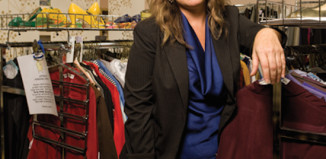Olympia Dukakis is a busy lady. In the midst of working in Los Angeles in the Getty Villa’s recent production of Sophocles’ Elektra (she played the Chorus), the academy award- winning actress spoke with us about Hollywood, her longtime bond with the LGBT community and her passionate advocacy to raise awareness about domestic violence. Dukakis is visiting Austin for the first time in about three years to speak at an event for SafePlace, a local organization that combats sexual abuse and domestic violence.
Are you looking forward to visiting Austin?
I am! I love Austin. There’s something about it that reminds me of New York: You get on the street and everybody has an appetite for life. They have places to go and people to see. I like the spirit of Austin.
What’s your favorite Greek tragedy?
Hecuba by Euripides, because it’s about the politicizing of justice and how it’s controlled by the affluent. It’s a very difficult thing, democracy. The Greeks understood it and they had trouble with it themselves.
Why do you have such a large following in the LGBT community?
It’s the parts that I’ve done and how I’ve done them. I have not done them with judgment and I’ve treated [the characters] like human beings struggling to find a way to live and be in the world.
What was your first exposure to a gay person?
When I was in college, I had a friend. We became very good friends, even to the very end when he got sick with AIDS. He lasted on the cocktail for about ten years and decided he wanted to end his life. So, I said, a week or two before you do that, no matter where you are in the world, call me and I’ll be there. He was back home in Ohio, so I went there. We had a wonderful reunion, we talked, we laughed, and a week later, he was gone. He was a lifelong friend. He was there for me many times.
Do you miss your role as transgender, marijuana-friendly Anna Madrigal (in Tales of the City, the 1993 miniseries based on the novels of Armistead Maupin)?
Oh yes, we did three of them and I always hoped we would do the other three. They’re doing a musical version of it at American Conservatory Theater in San Francisco next year.
How did you learn about SafePlace?
They came to me. I’ve done a lot of benefits for domestic violence organizations. It doesn’t matter how educated or wealthy people are, domestic violence is present, and it doesn’t matter what part of the world you come from, it’s an equal opportunity nightmare.
Tell me about your association with SafePlace and why you’re passionate about this issue.
I have been very involved for many years. It’s really a pandemic, this domestic violence. Anything we can do to call attention to it, for people to know it’s happening, to know there’s an opportunity to address it and to learn more–that is the best-case scenario. The worst case is that [the organization] provides safe places for women and children so they can begin to pull their lives together and redesign themselves, if you will, so they can have a life they want to live.
Why do you think so many gay and lesbian people are so drawn to the theater?
The theater is full of people who are other and it’s a place where other is accepted. The only thing that’s not accepted is not having talent and ability.
Who has been your mentor?
I have had a number of wonderful people mentor me over the years, including Peter Kass, an acting teacher. I have learned so much from my children.
How do you feel things have progressed in terms of roles for women?
It reflects where we are culturally. I have been fortunate, there are roles like the one in Cloudburst that reflect my need to have parts that are about something, and some of them are really extraordinary. I’m going to do Tennessee Williams’ The Milk Train Doesn’t Stop Here Anymore at the roundabout in New York in January.




































